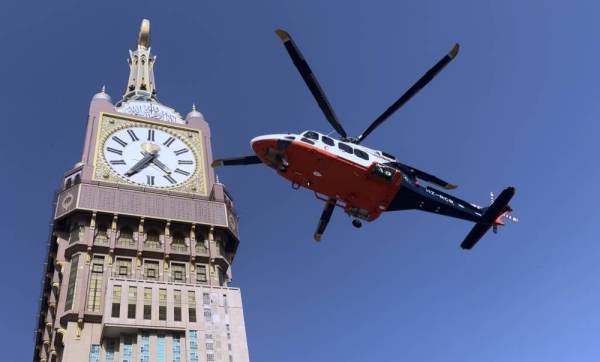The Hajj is an annual Islamic pilgrimage to Makkah, Saudi Arabia, and is a holy obligation for all Muslims who are physically and financially able to undertake the journey. The Hajj 1445 AH, which took place in recent years, saw the Saudi Red Crescent Authority respond rapidly to an emergency involving an African pilgrim in his sixties who was experiencing severe chest pain. This emergency marked the first time the Red Crescent utilized the air ambulance service from the Clock Tower landing pad near the Grand Mosque, demonstrating the organization’s commitment to providing top-notch medical care during the pilgrimage.
Upon receiving the distress call, the Red Crescent’s command center swung into action, coordinating an immediate response to the emergency. Medical teams swiftly arrived at the scene and conducted a thorough examination of the pilgrim, which included an electrocardiogram (ECG) to assess his condition. Following their assessment, the medical teams determined that the patient required specialized treatment that could only be provided at a medical facility, prompting them to make the decision to transport the pilgrim by air to ensure he received the urgent care needed to address his medical condition.
Thanks to the swift response and efficient handling of the situation by the Red Crescent Authority, the pilgrim was safely airlifted to King Abdullah Medical City, where he could receive the specialized treatment required to address his severe chest pain. This incident serves as a testament to the advanced medical readiness and resources available during the Hajj to address any emergency that may arise, underscoring the importance of having well-equipped medical services in place to cater to the needs of pilgrims who may require urgent medical attention during their pilgrimage.
The utilization of the air ambulance service from the Clock Tower landing pad near the Grand Mosque during the Hajj 1445 AH highlights the commitment of the Saudi Red Crescent Authority to providing efficient and effective medical care to pilgrims in need. By being able to transport the pilgrim swiftly to a medical facility equipped to handle his condition, the Red Crescent demonstrated its dedication to ensuring the well-being of all pilgrims during the Hajj, regardless of their nationality or background. This incident also showcases the critical role that air ambulance services can play in expediting the transport of patients to specialized medical facilities, especially in cases where time is of the essence and immediate treatment is required to save lives.
The prompt response and successful handling of this emergency by the Red Crescent Authority during the Hajj 1445 AH serve as a reminder of the importance of having well-trained medical teams and advanced medical resources in place to address any emergency situations that may arise during the pilgrimage. By having a robust medical infrastructure in place, the authorities can ensure that pilgrims receive the necessary medical attention in a timely manner, thereby minimizing the risk of complications and improving the chances of a successful outcome for patients in need of urgent care. This incident underscores the crucial role that organizations like the Red Crescent play in safeguarding the health and well-being of pilgrims during the Hajj, underscoring the importance of investing in medical services and resources to support the smooth conduct of the pilgrimage each year.
In conclusion, the emergency involving the African pilgrim in his sixties who experienced severe chest pain during the Hajj 1445 AH serves as a poignant example of the critical role that advanced medical services play in ensuring the safety and well-being of pilgrims during their journey to Makkah. The swift response and efficient handling of the situation by the Saudi Red Crescent Authority, including the utilization of the air ambulance service, underscore the organization’s commitment to providing top-notch medical care to all pilgrims in need. By having well-trained medical teams, advanced medical resources, and efficient transport services in place, the authorities can ensure that pilgrims receive the necessary care promptly, improving their chances of a successful recovery. This incident serves as a powerful reminder of the importance of investing in medical services and resources to support the Hajj pilgrimage and underscores the critical role that organizations like the Red Crescent play in safeguarding the health and well-being of pilgrims during this sacred journey.











